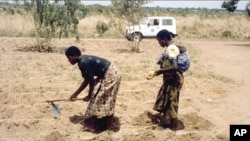Enthusiasm about development progress is at an all-time high in Malawi since the swearing in of its new president, Joyce Banda, in April of this year. U.S. Secretary of State, Hillary Clinton recently applauded Banda’s administration for improvements in economic policy and human rights and her commitment to agriculture development as one of five key focus areas.
Along with these high hopes, Malawi still faces challenges. This primarily agricultural southern African country sporadically faces food security crises that are caused by a number of factors, including drought, floods, erratic rainfall, and pests.
For example, despite several years of good harvests, southern Malawi is currently experiencing localized acute food insecurity. Malawi government’s Vulnerability Assessment Committee estimates that about 1,630,000 people will need food assistance in the fall of 2012 and the first half of 2013.
As part of President Barack Obama’s global hunger and food security initiative, Feed the Future, the United States is concentrating on helping Malawi improve its agricultural sector. Working in partnership with the government of Malawi, the United States is helping to develop the country’s domestic and export markets, increase food availability and improve agricultural policies so the country can improve the food security of its population.
The United States is also investing in the development and improvement of high-value agricultural products, such as legumes and milk, which help farmers raise their incomes and gain better access to nutritious food.
During her recent visit to Malawi, Secretary of State Hillary Clinton said that over the past decade, the United States’ support for the dairy sector has resulted in a 500 percent increase in Malawi’s milk production, benefitting thousands of farmers.
“Malawi and the United States are building on this success. I am pleased to announce that over the next three years, the United States intends to invest in Malawi more than $46 million to strengthen the entire agricultural chain,” she said.
“We want to help agriculture in Malawi get even stronger, so that all the children will have better lives,” said Secretary Clinton. “And I particularly want to thank the women farmers who are here before me for their hard work, and their families, their husbands, and their children for being part of this successful program. I look forward to hearing more about the success of our support for agriculture here in Malawi.”
Along with these high hopes, Malawi still faces challenges. This primarily agricultural southern African country sporadically faces food security crises that are caused by a number of factors, including drought, floods, erratic rainfall, and pests.
For example, despite several years of good harvests, southern Malawi is currently experiencing localized acute food insecurity. Malawi government’s Vulnerability Assessment Committee estimates that about 1,630,000 people will need food assistance in the fall of 2012 and the first half of 2013.
As part of President Barack Obama’s global hunger and food security initiative, Feed the Future, the United States is concentrating on helping Malawi improve its agricultural sector. Working in partnership with the government of Malawi, the United States is helping to develop the country’s domestic and export markets, increase food availability and improve agricultural policies so the country can improve the food security of its population.
The United States is also investing in the development and improvement of high-value agricultural products, such as legumes and milk, which help farmers raise their incomes and gain better access to nutritious food.
During her recent visit to Malawi, Secretary of State Hillary Clinton said that over the past decade, the United States’ support for the dairy sector has resulted in a 500 percent increase in Malawi’s milk production, benefitting thousands of farmers.
“Malawi and the United States are building on this success. I am pleased to announce that over the next three years, the United States intends to invest in Malawi more than $46 million to strengthen the entire agricultural chain,” she said.
“We want to help agriculture in Malawi get even stronger, so that all the children will have better lives,” said Secretary Clinton. “And I particularly want to thank the women farmers who are here before me for their hard work, and their families, their husbands, and their children for being part of this successful program. I look forward to hearing more about the success of our support for agriculture here in Malawi.”




